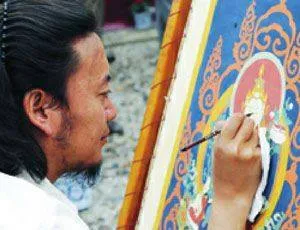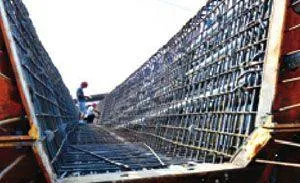Bon Voyage
Naval crews aboard the Chinese Navy training vessel Zheng He are welcomed at the Chinhae Port in the Republic of Korea(ROK) on August 4 for a fourday goodwill visit to the country.
It is the second time for the vessel to visit the ROK. The first time was in 2009 during the vessel’s 158-day global goodwill voyage.

Nuclear Transparency
China’s largest nuclear power company announced it would hold annual open house events every August 7 to make its operations more transparent.
The China General Nuclear Power Group (CGN), operator of the Daya Bay Nuclear Power Plant in Shenzhen in south China’s Guangdong Province, said on August 7 the move will help boost public trust in the safety of nuclear power.
The 2011 leakage of radioactive material from the Fukushima nuclear power plant in Japan has raised concerns about nuclear safety in China.
A planned CGN nuclear fuel processing project in Guangdong’s city of Heshan was cancelled in July due to opposition from local residents.
CGN supplies 53 percent of China’s nuclear power. It is the largest builder of nuclear power plants in the world and its Daya Plant is currently China’s largest.
Free HIV Therapy
Authorities have set up a pilot program in 12 counties and cities in nine provinces to provide free onestop antiretroviral therapy for HIV/ AIDS patients, the Chinese Center for Disease Control and Prevention confirmed on August 2.
Patients in areas where the trial is being conducted will receive rapid access to antiretroviral therapy if they are diagnosed with HIV, the center said.
According to the center’s AIDS Treatment and Care Division, HIV/ AIDS patients used to spend two months traveling between local disease control centers and hospitals to receive the therapy.
According to statistics from the center’s nationwide surveillance network, China has more than 390,000 registered HIV/AIDS patients.

Misinformation Control
Five portals and Sina Weibo, a Twitter-like microblogging service, jointly launched a website on August 1 to refute online misinformation. The portals include Qianlong, Sogou, Sohu, Netease and Baidu.
The website collects statements from microblogs, news portals and China’s biggest search engine, Baidu, to refute false rumors and expose phishing websites.
The site operates under the instruction of the Beijing Internet Information Office and the Beijing Internet Association, a non-profit social organization.
The first phase of the new website has been completed. Operators of the platform will spend another year finishing the second phase. Once complete, entertaining and interactive programs will be introduced to encourage the public to report online false rumors.
Family Planning Shift
The National Health and Family Planning Commission denied a timetable had been determined to relax the country’s family planning policy by 2015 to allow more couples to have two children, China Daily reported on August 7.
The commission, however, did confirm media reports that an update is on its way. In the new plan, couples will be allowed to have a second child if at least one parent has no siblings.
Currently, the policy permits couples to have two children if both parents are the only children. It is one of several exceptions to the rule in which most couples have been restricted to just one child since the late 1970s.
In most rural areas, families can apply to have a second child if their first-born is a daughter.
The commission also announced that there will be favorable measures for families that adhere to the current policy in respect to elderly care and medical care services.
Ethnic Villages
The Chinesd34d0166bb266317165ae6834dd10dfbe Government on August 4 initiated a program to locate and preserve the most distinct ethnic villages across the country.
The State Ethnic Affairs Commission plans to visit 100 villages that have the most distinct ethnic characters all over the country.
“By going on this tour, we want to raise the social awareness of protecting ethnic cultures and intangible cultural heritage,” said Shi Xiaoliang, secretary general of the program’s organization committee. In recent decades, the number of China’s villages has dropped from 3.6 million to 2.7 million, meaning 200 villages disappear from the country every day.
Biowarfare Evidence
Chinese experts recently uncovered more than 40 items in southwest China’s Yunnan Province that offer fresh evidence of Japanese germ warfare activities during World War II.
The findings came from field research in May that focused on 15 sites affected by germ warfare during World War II in Yunnan, said Yang Yanjun, a researcher with the Harbin Academy of Social Sciences in northeast China’s Heilongjiang Province who studies Unit 731, the Japanese troops’ biological warfare unit.
The items included protective clothing, rat cages and syringes, Yang said.
The results of the research confirmed that Japanese military forces launched biological attacks in Yunnan when they invaded the region in May 1942.
Legal Training
China will train 300 lawyers to proficiency in foreign-related business within the next four years, under a program launched by the All-China Lawyers Association (ACLA) on August 5.
Initiated by the Ministry of Justice and the ACLA, the scheme has gained the government’s financial support and will focus on training 120 lawyers in three area—foreign investment, cross-border mergers and acquisitions, and international financial and securities businesses—so they can help more Chinese companies go abroad.
It will also train 150 lawyers in international trade, copyright protection and businesses concerning the World Trade Organization, as well as 30 lawyers in businesses concerning resources, maritime and space rights.
Three Million Jobless
More than 3 million graduates in China are struggling to find jobs this year, according to a report on China’s social security, released on August 4.
With nearly 7 million graduates this year, and adding on the unemployed students from previous years, the number of graduates struggling to find jobs before leaving school is estimated to have reached over 3 million, said Wang Yujun, an official with the Ministry of Human Resources and Social Security, at a press conference for the 2012 China Social Security Reform and Development Report.
Inspiring Design

A solar-powered house is displayed at the 2013 China Solar Decathlon on August 2-13 in Datong, Shanxi Province.
The Decathlon is a solar building science and technology competition for universities around the world. It involves the integration of solar energy, energy conservation and build- ing techniques, having attracted students from more than 100 universities in America, Europe and Asia to participate in previous events.
China is the first Asian country to host the Decathlon this year, with the participation of 22 teams from 35 universities in 13 countries.
Nature’s Treasure
Farmers pick grapes in Binchuan County, Yunnan Province. The county produces 2,000 kg of grapes per mu (667 square meters). The popular grapes have been sold in China and abroad.

Price-Fixing Fines
China has issued record fines of 670 million yuan ($108 million) on six baby formula companies on the mainland following an anti-trust probe, according to an announcement by the National Development and Reform Commission (NDRC) on August 7.
Biostime was fined 163 million yuan ($26.63 million), or 6 percent of its sales revenue in 2012, as it “seriously violated anti-monopoly laws and failed to actively take corrective action,” said Xu Kunlin, Director of the Price Department of the NDRC.
Mead Johnson was fined 204 million yuan ($33.33 million), or 4 percent of its previous year’s revenue last year, because it “did not actively cooperate with the investigation while taking active self-rectification measures,” said Xu.
Dumex, Abbott, Friesland and Fonterra each received a fine equal to 3 percent of their 2012 revenue. Xu said these four companies cooperated in the probe and actively moved to correct their practices.
Wyeth, Beingmate and Meiji were exempt from punishment, because they cooperated with the investigation, provided evidence and actively took self-rectification measures, said Xu.
Xu said in the probe into these nine companies initiated in March, the NDRC found the involved formula producers set minimum resale prices for distributors. The distributors that sold their products at a price lower than the fixed minimum price were punished.
Liquidity Injection

The People’s Bank of China (PBC), the central bank, continued to inject liquidity into the banking system on August 6, with 12 billion yuan ($1.96 billion) of seven-day reverse repurchase agreement (repo) operations.
The yield of the reverse repo, a process whereby the central bank purchases securities from commercial banks with an agreement to resell them at a future date, fell from 4.4 percent to 4 percent, according to a PBC statement.
Changes in the yields of the reverse repo rate usually reflect how the central bank views the current borrowing costs in the market and how it will guide future lending rates.
The injection is the third since July 30, when the central bank resumed the reverse repo sales after a suspension of about six months. But experts said the central bank’s move does not mean a change in its prudent monetary policy.
Economic Stabilizing
China’s official Purchasing Managers’Index (PMI) for the manufacturing sector picked up slightly to 50.3 in July from 50.1 in June, signaling a stabilizing trend in the country’s economy.
Zhao Qinghe, a senior economist with the National Bureau of Statistics(NBS), said it was the 10th consecutive month that the PMI has hovered around 50.5 since October 2012. A reading below 50 indicates a contraction of activity. Most sub-indices also increased from a month earlier.
Zhang attributed the rise in confidence to a series of “mini-stimulus”measures adopted since early July, which include tax breaks for microsized businesses and accelerated spending on subsidized housing, urban infrastructure, high-speed rail and energy-saving industries.
The non-manufacturing PMI stood at 54.1 percent in July, up from 53.9 percent for June, according to the NBS. The PMI for China’s nonmanufacturing sector rebounded after falling for three consecutive months.

Trade Improves
China’s foreign trade grew 7.8 percent year on year to $354.16 billion in July, gradually recovering from June’s unexpected tumble, the General Administration of Customs said on August 8.
Exports went up 5.1 percent year on year to $185.99 billion in July, while imports gained 10.9 percent to$168.17 billion.
The trade surplus narrowed by 29.6 percent year on year to$17.82 billion in July, as import gains outpaced export gains.
In July, trade with the EU, China’s largest trade partner, rose 5 percent, while that with the United States, China’s second largest trade partner, rose 10 percent.
Trade with Association of Southeast Asian Nations increased 13.1 percent. Trade with Japan shrank 6.1 percent in July.
Exports of electronics and ma- chinery grew by 4 percent to reach$102.85 billion in July, accounting for 55.3 percent of total exports.
WeChat 5.0
The battle between China’s Internet titans intensified as Tencent Holdings Ltd. started allowing its WeChat users to make online payments on August 5, a move that taps into the lucrative e-commerce market, which has been traditionally dominated by its archrival Alibaba.
WeChat, the most popular messaging and social media app developed by Tencent, released its version 5.0 on August 5, in the product’s biggest update since it was launched in January 2011.
The new features of WeChat 5.0 include games, scanner tools and—most importantly—payment integration, which is seen by many insiders as the most aggressive function of all.
The WeChat payment function can integrate bank accounts (credit or debit cards) with a customer’s WeChat account, which allows WeChat’s more than 400 million users to make purchases on several e-commerce platforms.
With the help of scanner tools, goods can be scanned using a product’s barcode, allowing the user to jump directly onto the e-commerce website and order it immediately.
Reach for The Sky
The main body of the Shanghai Center was completed on August 3. The building, with a height of 632 meters, will be the tallest in China when complete.

